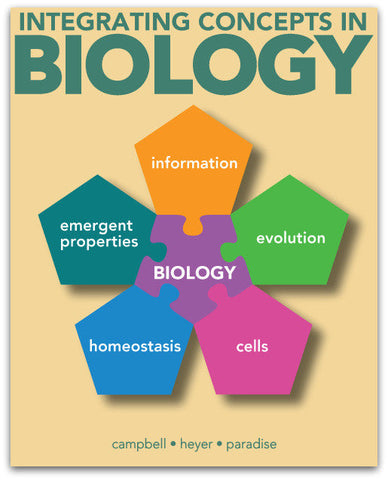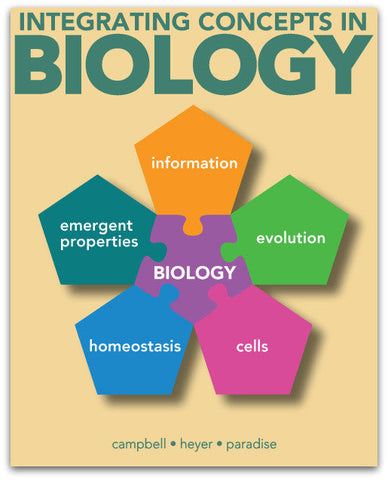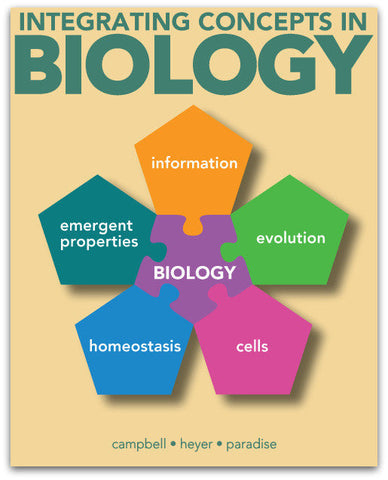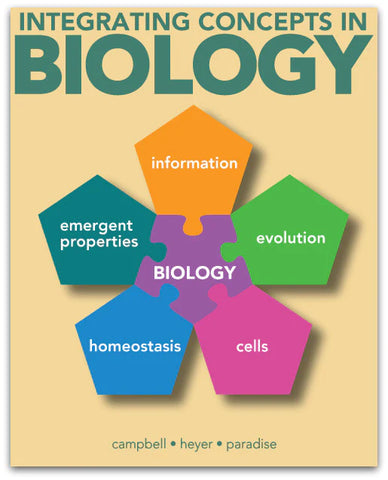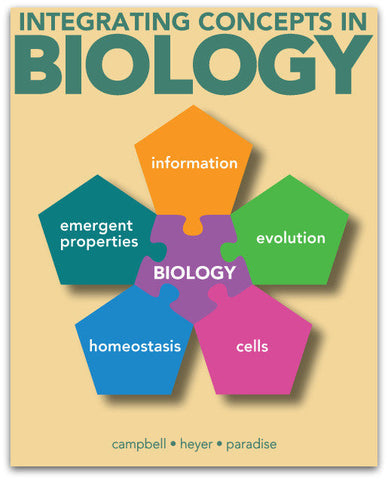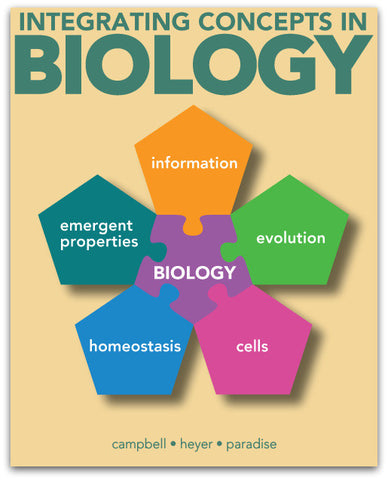
- Integrating Concepts in Biology - Purchase for Individual Use (NOT FOR A COURSE)
Important: If you are a student interested in purchasing a copy of this book for your class, you should search for your school, course name, or professor. Each instructor has a unique book created for their course, which you will not be added to if you purchase this version of the text. Digital textbooks on the Trunity eLearning platform also include interactive quizzes and other material for your class, so it is very important that you purchase the correct course.
If you are a student, please click here to find your course.
If you are an educator planning on adopting this book for your class, please click here to request an examination copy.
Overview
Integrating Concepts in Biology (ICB) is a living digital textbook that presents the main concepts of biology in a new, comprehensive format for majors' introductory biology courses. ICB:
- focuses on 5 “Big Ideas” at 5 size scales so students attain deeper understanding of major concepts rather than disjointed facts
- emphasizes experimental design and data interpretation – the process of science
- employs pedagogy that maximizes student learning and retention
The core recommendations of BIO2010 and Vision and Change are the foundation for ICB. Vision and Change called for new textbooks to support student learning. Specific recommendations included a focus on core concepts (what we call Big Ideas) and core competencies, which include quantitative reasoning, critical thinking, the ability to apply the process of science and understanding the link between science and society. Students using ICB will learn core concepts and analytical skills simultaneously.
ICB uses original data from the literature and Integrating Questions that facilitate exploration of the data. Students interpret data that were analyzed by biologists in the context of answering fundamental questions about biology. Integrating Questions help students focus on the main points, analyze data, apply mathematics and construct knowledge.
Bio-Math Explorations help students understand how mathematics can yield profound insights into biological concepts. The math is readily accessible, ranging from simple arithmetic, algebra, and geometry, to more challenging examples in probability, statistics and modeling. We provide the content and pedagogy necessary for biologists to use math while teaching biology.
Ethical, Legal, Social, Implications sections (ELSIs) raise student awareness about the real-world aspects of case studies as they learn fundamental concepts. ELSIs help students grapple with their own ethical perspectives on emotional topics that relate to biology, such as evolution, stem cells, the definition of life, a species’ right to exist, and the costs and benefits of genetically modified organisms.
ICB can help you convert your classroom to a place where the scientific process provides the context and substance of teacher-student interaction. If you want your students to experience their first college biology course the way you experience biology in your professional life, then take the leap and be a part of the national movement to improve introductory biology education. Bring the passion of science back into your class and watch your students realize why biology fascinates you every day.
Table of Contents
Information in Molecules and Cells
Chapter 1: Heritable Material
Chapter 2: Central Dogma
Chapter 3: Reproduction and Cell Division
Evolution of Molecules and Cells
Chapter 4: Evolution and Origin of Cells
Chapter 5: Evolution Applied
Chapter 6: Evolution of Eukaryotes
Cells at the Molecular and Cellular Levels
Chapter 7: Molecular Structure and Function
Chapter 8: Cell Structure and Function
Chapter 9: Neurons and Muscles
Homeostasis of Molecules and Cells
Chapter 10: Cellular Respiration
Chapter 11: Photosynthesis
Chapter 12: Plant Physiology
Emergent Properties of Molecules and Cells
Chapter 13: Molecular Switches
Chapter 14: Cell Networks
Chapter 15: Animal Physiology
Information in Populations and Ecological Systems
Chapter 16: Variation and Population Genetics
Chapter 17: Behavior
Chapter 18: Information in the Environment
Evolution in Populations and Ecological Systems
Chapter 19: Mechanisms of Evolution
Chapter 20: Evolutionary History
Chapter 21: Evolution of Interactions in Communities
Cells in Populations and Ecological Systems
Chapter 22: Disease
Chapter 23: Cells in Tissues
Chapter 24: Ecological Dynamics
Emergent Properties in Populations and Ecological Systems
Chapter 25: Individuals and Emergence
Chapter 26: Properties of Populations
Chapter 27: Ecological Interactions
Homeostasis of Populations and Ecological Systems
Chapter 28: Organismal Homeostasis
Chapter 29: Population Homeostasis
Chapter 30: Ecological Homeostasis
About the Authors
A. Malcolm Campbell
A. Malcolm Campbell earned his Ph.D. in cell and molecular biology from The Johns Hopkins University in 1992. Campbell was awarded a Pew Teacher-Scholar postdoctoral fellowship where he studied under Jan Serie at Macalester College. Campbell is a Professor of Biology and the director of the James G. Martin Genomics Program at Davidson College. He is the founding director of the Genome Consortium for Active Teaching (GCAT), which connects undergraduates with research-quality genomic learning materials. With his colleague Laurie Heyer, he wrote the first true genomics textbook for undergraduates, Genomics, Proteomics and Bioinformatics, now in its second edition. He won the American Society for Cell Biology’s Bruce Alberts Excellence in Education Award and the Hunter-Hamilton Love of Teaching award from Davidson College. He served as co-Editor-in-Chief of CBE-Life Sciences Education and is a charter member of the Society for the Advancement of Biology Education Research (SABER). His scholarship covers both education research and undergraduate-driven synthetic biology. Heyer and Campbell collaborate with their students to perform synthetic biology research.
Laurie J. Heyer
Laurie Heyer received her B.S. in Mathematics from the University of Texas at Arlington. She began research in bioinformatics for her Ph.D. in Applied Mathematics, which she received from the University of Colorado at Boulder in 1998. She was a postdoctoral fellow with Michael Waterman in the Center for Computational and Experimental Genomics at the University of Southern California. As Professor and Chair of Mathematics and Computer Science at Davidson College, Dr. Heyer teaches a cross-listed course in bioinformatics that draws both math and biology majors. She has also developed a two-semester sequence in calculus and modeling that focuses on applications in the life science. Heyer wrote “Math Minutes” for Discovering Genomics, Proteomics & Bioinformatics, co-authored with her colleague Malcolm Campbell. With her students, she developed software for microarray data analysis, and taught analysis methods to faculty in national workshops through the Genome Consortium for Active Teaching (GCAT). Her current research, in collaboration with Campbell and interdisciplinary teams of undergraduates, is in synthetic biology.
Christopher J. Paradise
Chris Paradise is Professor of Biology and Environmental Studies at Davidson College. Paradise earned his BS from the State University of New York at Albany, his MA from the State University of New York at Binghamton and his PhD from The Pennsylvania State University. In addition to introductory biology, Paradise teaches ecology, entomology, and several topical seminar courses such as ecotoxicology and renewable natural resources. He also occasionally leads a study abroad program in India. His research evaluates factors that influence biodiversity at a variety of scales. He has done research on diversity of organisms living in streams, in treeholes, on decomposing corpses, and on sustainably managed farms. His current research interests include effects of land use patterns on pollinator communities in parks and spatial and temporal dynamics of cankerworms, an urban forest pest. His papers document how communities in each of these ecological systems are affected by both abiotic and biotic factors. His research also informs his teaching; several research projects have been incorporated as investigative exercises in ecology and entomology courses. Paradise is passionate about raising awareness of the roles insects play in ecosystems and does community outreach on insect collecting, identification, and natural history.
We Also Recommend

